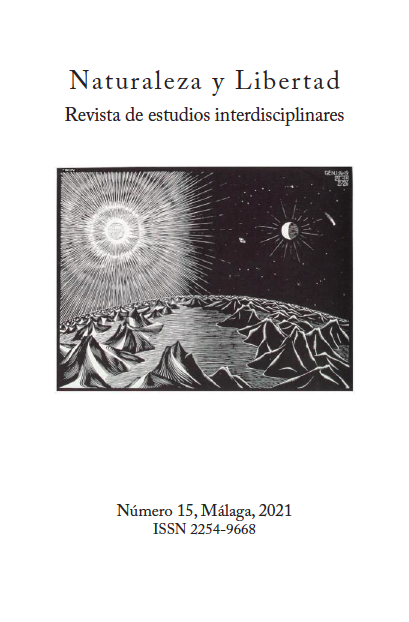Philosophical concepts that influenced the set theories discovered by Bertrand Russell
DOI:
https://doi.org/10.24310/NATyLIB.2021.vi15.12491Keywords:
Russell, Cantor, Kant, Hegel, Leibniz, Saint Anselm, A priori judgements, Synthetic judgements, Logicism, Potential infinity, Actual infinityAbstract
In this paper I examine some of Bertrand Russell's philosophical presuppositions underlying his discovery of paradoxes in Cantor's set theory: Kant's a priori and synthetic judgments, Leibniz's logicism, the Hegelian worldview, St. Anselm's ontological argument.
Downloads
Metrics
References
Doxiadis, Papadimitriou. (2014). Logicómix. Una búsqueda épica de la verdad. Barcelona: Publicaciones y Ediciones Salamandra, S. A.
Euclides. (2000). Elementos. Libros I-IV. Barcelona: Biblioteca Básica Gredos.
Garciadiego, A. R. (1992). Bertrand Russell y los orígenes de las “paradojas” de la teoría de conjuntos. Madrid: Alianza Editorial.
Russell, B. (2010). Autobiografía. Barcelona: Edhasa.
Xirau, R. (2011). Introducción a la historia de la filosofía. México: UNAM.
Downloads
Published
How to Cite
Issue
Section
License
Those authors who have publications with this journal, accept the following terms:
1. Copyright and licensing information are clearly described on the journal’s web site: all content published in Naturaleza y Libertad is open acces without limit, and are subject to the Attribution-NonCommercial-ShareAlike 4.0 International (CC BY-NC-SA 4.0) license. The full text of which can be consulted at https://creativecommons.org/licenses/by-nc-sa/4.0/
2. It is the responsibility of the authors to obtain the necessary permissions for the images that are subject to copyright. The authors whose contributions are accepted for publication in this journal will retain the non-exclusive right to use their contributions for academic, research and educational purposes, including self-archiving or deposit in open access repositories of any kind. The electronic edition of this magazine is edited by the Editorial de la University of Malaga (UmaEditorial), being necessary to cite the origin in any partial or total reproduction.
3. This journal allows and encourages authors to publish papers on their personal websites or in institutional repositories, both before and after their publication in this journal, as long as they provide bibliographic information that accredits, if applicable, your posting on it.
4. In no case will anonymous papers be published.





18.png)













